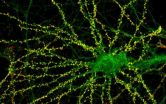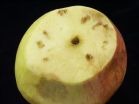(Press-News.org) PASADENA, Calif. -- Although many mental illnesses are uniquely human, animals sometimes exhibit abnormal behaviors similar to those seen in humans with psychological disorders. Such behaviors are called endophenotypes. Now, researchers at the California Institute of Technology (Caltech) have found that mice lacking a gene that encodes a particular protein found in the synapses of the brain display a number of endophenotypes associated with schizophrenia and autism spectrum disorders.
The new findings appear in a recent issue of the Journal of Neuroscience, with Mary Kennedy, the Allen and Lenabelle Davis Professor of Biology at Caltech, as the senior author.
The team created mutations in mice so that they were missing the gene for a protein called densin-180, which is abundant in the synapses of the brain, those electro-chemical connections between one neuron and another that enable the formation of networks between the brain's neurons. This protein sticks to and binds together several other proteins in a part of the neuron that's at the receiving end of a synapse and is called the postsynapse. "Our work indicates that densin-180 helps to hold together a key piece of regulatory machinery in the postsynaptic part of excitatory brain synapses," says Kennedy.
In mice lacking densin-180, the researchers found decreased amounts of some of the other regulatory proteins normally located in the postsynapse. Kennedy and her colleagues were especially intrigued by a marked decrease in the amount of a protein called DISC1. "A mutation that leads to loss of DISC1 function has been shown to predispose humans to development of schizophrenia and bipolar disorder," Kennedy says.
In the study, the researchers compared the behavior of typical mice with that of mice lacking densin. Those without densin displayed impaired short-term memory, hyperactivity in response to novel or stressful situations, a deficit of normal nest-building activity, and higher levels of anxiety. "Studies of mice with schizophrenia and autism-like features have reported similar behaviors," Kennedy notes.
"We do not know precisely how the molecular defect leads to the behavioral endophenotypes. That will be our work going forward," Kennedy says. "The molecular mechanistic links between a gene defect and defective behavior are complicated and, as yet, mostly unknown. Understanding them goes to the very heart of understanding brain function."
Indeed, she adds, the findings point to the need for a better understanding of the interactions that occur between proteins at synapses. Studies of these interactions could provide information needed to screen for new and better pharmaceuticals for the treatment of mental illnesses. "This study really reinforces the idea that small changes in the molecular structures at synapses are linked to major problems with behavior," Kennedy says.
INFORMATION:
Caltech coauthors of the paper, "Deletion of Densin-180 Results in Abnormal Behaviors Associated with Mental Illness and Reduces mGluR5 and DISC1 in the Postsynaptic Density Fraction," include Paul Patterson, the Anne P. and Benjamin F. Biaggini Professor of Biological Sciences; Holly Carlisle; Tinh Luong; Andrew Medina-Marino; Leslie Schenker; Eugenia Khorosheva; Keith Gunapala; and Andrew Steele. The paper's other authors are Tim Indersmitten and Thomas O'Dell of the David Geffen School of Medicine at the University of California, Los Angeles. The work was supported by the National Institutes of Health, the Gordon and Betty Moore Foundation Center for Integrative Study of Cell Biology, the Howard Hughes Medical Institute, the National Science Foundation, the McGrath Foundation, and the Broad Fellows in Brain Circuitry program.
Caltech scientists point to link between missing synapse protein and abnormal behaviors
2011-11-24
ELSE PRESS RELEASES FROM THIS DATE:
Scientific sleuths pinpoint the guilty coral killers
2011-11-24
The elusive culprits that are killing countless coral reefs around the world can now be nabbed with technology normally used to diagnose human diseases, marine researchers say.
Coral researchers and reef managers will be able to identify coral infections using a new method that allows them to classify specific diseases based on the presence of microbes.
This could lead to more effective action to reduce the impact of disease on the world's imperilled coral reefs.
"Current classification of coral diseases is mostly based on a description of how the coral has deteriorated, ...
What Is Workers' Compensation in Pennsylvania?
2011-11-24
The Pennsylvania Workers' Compensation Act gives injured workers valuable rights. They include payment of medical bills, wage loss compensation, disfigurement awards for work-related facial and neck scars and awards for specific loss of use of a body part (ex. - leg, hand, finger, etc). The following are key points that workers should know about workers' compensation in Pennsylvania.
Workers' Compensation Benefits for Work-Related Injuries
According to the Pennsylvania Workers' Compensation Act, employers must give their full-time, part-time and seasonal employees ...
Blossom end rot: Transport protein identified
2011-11-24
Blossom end rot on tomatoes and cucumbers, bitter-pit in apples – these unpleasant blemishes on fruits and vegetables not only compromises the flavor but also causes significant harvest losses every year. The characteristic blotches and spotting can be traced back to insufficient calcium uptake or faulty calcium transport within the plant. Consequently, the damage can occur even if the soil provides sufficient calcium. A team under the leadership of scientists from the University of Zurich and Pohang University of Science and Technology, Korea, has for the first time identified ...
Spider mite's secrets revealed
2011-11-24
The tiny two-spotted spider mite (Tetranychus urticae) causes much anxiety for farmers, and has been, to date, a scientific mystery. It feeds on over 1,100 species of plants, including 150 greenhouse plants and crops, such as maize, soy, tomatoes and citrus. The cost of chemically controlling damage caused by the spider mite exceeds USD 1 billion per year. In the latest issue of the journal Nature, a multinational consortium of scientists publish the sequenced genome of the spider mite, revealing how it is capable of such feeding frenzy, as well as other secrets of this ...
Enhanced treatment of brain tumors
2011-11-24
Glioblastoma is regarded as the most malignant form of brain tumor. In many cases, neurosurgeons are not able to remove such tumors completely because of the risk of destroying too much brain tissue in the process. Moreover, it is often impossible to identify all the fine extensions by which the tumor spreads into surrounding healthy tissue. To at least slow down the growth of tumor cells that have remained in the head, almost all glioblastoma patients are treated by radiotherapy after surgery.
"Unfortunately, we can only delay cancerous growth in this way, but we cannot ...
Fault and Liability in California Slip and Fall Accidents
2011-11-24
Countless people sustain injuries each year while on the property of another person or business. Some of these injuries could have been prevented if the owner, manager or occupier of the property had taken basic safety precautions or behaved as a reasonable person would have in the same situation.
Every slip and fall or trip and fall accident does not automatically result in a personal injury claim, but some of them do. It takes a skilled personal injury attorney to know the difference between a frivolous case and one that is likely to succeed. Slip and fall, trip and ...
Closer to a cure for eczema
2011-11-24
Scientists have found that a strain of yeast implicated in inflammatory skin conditions, including eczema, can be killed by certain peptides and could potentially provide a new treatment for these debilitating skin conditions. This research is published today in the Society for Applied Microbiology's journal, Letters in Applied Microbiology.
20% of children in the UK suffer from atopic eczema and whilst this usually clears up in adolescence, 7% of adults will continue to suffer throughout their lifetime. Furthermore, this type of eczema, characterized by dry, itchy, flaking ...
Coming to terms with terror
2011-11-24
How will the terrorist attacks in Norway on 22 July change the country? That question has been put to three social scientists at the University of Stavanger (UiS).
"Norwegians are still in a state of shock," says professor Odd Einar Olsen. "These incidents were so extensive and gruesome that people need time to come to terms with them."
He is very interested to see what content Norway will give to promises made about more openness and democracy after the car-bombing in Oslo and the massacre at Utøya north of the capital.
"While people have united in sorrow, a crippling ...
Winter Weather Is Upon Us: How Drivers Can Stay Safe
2011-11-24
The long, cold Minnesota winters never fail to blanket the state's roadways, causing many weather-related accidents that can range from minor to severe. Minnesota was sixth in the nation for icy road fatalities during the 2009-2010 season, with 18 fatal accidents during that winter.
Minneapolis weather-related auto accident attorneys and other people who work with accident victims understand the danger that comes with winter driving. They encourage safe, cautious driving in the snow, ice and sleet.
Fortunately, there are several things drivers can do to stay safe ...
UMD poll: Egyptians see military putting brake on revolution 2:1
2011-11-24
COLLEGE PARK, Md. - A new University of Maryland public opinion poll finds Egyptians harboring serious doubts about their military's commitment to the revolution that ousted the Mubarak regime last spring.
In the poll, 43 percent of Egyptians said they believe military authorities are working against the aims of the revolution, compared to nearly 21 percent who saw them as advancing these aims.
"There appears to be a major shift in Egyptian public attitudes toward military authorities, and this will likely have important consequences for politics there in coming weeks," ...

